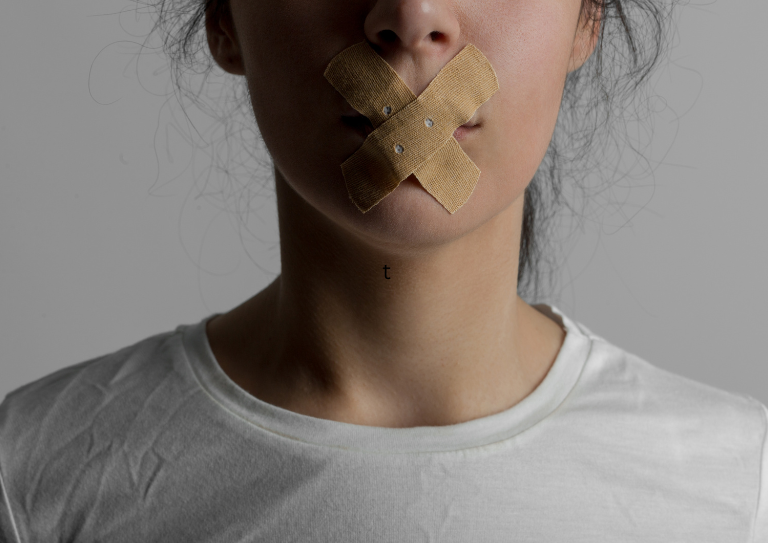You may have stumbled upon videos of people taping their mouths shut before they sleep. While the idea of mouth taping may sound like a bizarre and uncomfortable practice, proponents of this viral TikTok trend claim that it helps them sleep better and prevents dry mouth and snoring.
So why are people forcing their mouths shut during sleep? Does it work — and is it safe?
What is Mouth Taping?
Mouth taping is the process of taping your mouth closed with skin-safe tape to force you to breathe through your nose instead of your mouth while you sleep. The goal of mouth taping is to reduce the adverse side effects of mouth breathing by forcing you to breathe through your nose.
Does Mouth Taping Work? Is it Safe?
Mouth tapers claim that sealing their lips at night has helped them reduce their snoring, sleep better and improve their oral hygiene, but there is no conclusive research on the practice.
Experts warn that mouth taping may not be entirely safe, and causes:
- Difficulty breathing if you have nasal congestion
- Worsening of sleep apnea and its risk factors
- Allergies
- Lip irritation from the tape
- Dry lips
Mouth taping promises to keep the mouth shut during sleep. But you wouldn’t have to open your mouth to breathe unless you’re having trouble breathing through your nose.
Some people are trying mouth taping to kick their snoring habit. If you or a sleep partner notices that you snore during the night, you may have obstructive sleep apnea (OSA) and you should talk to your doctor. Mouth taping won’t treat sleep apnea symptoms. Someone suffering from a serious condition such as OSA cannot stop the condition by forcing their mouth shut.
When left untreated, sleep apnea can lead to high blood pressure, heart disease, diabetes, and obesity. Although it may appear that mouth taping helps with snoring, it can worsen sleep apnea by making breathing more difficult. As a result, it puts the person at a higher risk for the dangers associated with sleep apnea, including heart attacks and death.
Mouth taping does NOT address the root cause of the problem.
If you breathe through your mouth at night, it is a sign that you cannot breathe properly through your nose, due to congestion from allergies, an illness, improper tongue posture or airway obstruction. Simply putting a piece of tape over your mouth won’t solve the issue causing you to mouth breathe at night in the first place.
The right way to breathe is through your nose.
Nasal breathing offers various benefits that breathing through your mouth doesn’t have, such as:
- Increased oxygen intake
- Filters allergens, pathogens and dust
- Humidifies and warms inhaled air
- Improved immunity
In contrast, mouth breathing has various side effects, such as:
- Dry mouth and sore throat
- Bad breath and tooth decay
- Linked to crooked teeth and facial deformities
- Poor sleep quality and increased risk of snoring and sleep disorders
- Decreased energy levels and ability to focus
“When mouth breathing, we tend not to breathe optimally, causing issues like snoring, upper airway resistance syndrome and apnea,” says Dr Yue Weng Cheu, Clinical Director of DP Dental.
What’s a Better Way to Improve sleep and Reduce Snoring?
Mouth taping is similar to a band-aid fix – it is a temporary solution that does not address the underlying causes of sleep apnea, snoring, and other oral health issues. At DP Dental, we believe in getting to the root cause of a problem through holistic, science-backed approaches.
Instead of forcing your mouth shut with tape, we recommend myofunctional therapy – a science-backed, non-invasive approach that helps you breathe better and effectively reduces the symptoms of sleep apnea, snoring, and other conditions.
Myofunctional therapy involves a series of exercises designed to strengthen the muscles of the mouth, tongue, and face and enable proper breathing, chewing, and swallowing habits.
Myofunctional therapy is an evidence-based, minimally-invasive approach that is free of side effects. The main goal of myofunctional therapy is to establish nasal breathing and proper tongue posture. Doing so makes it easier to maintain an open airway while sleeping.
There is increasing evidence that myofunctional therapy can reduce the severity of snoring and sleep apnea. Research shows that myofunctional therapy decreases the apnea-hypopnea index (AHI) by approximately 50% in adults and 62% in children.
Additionally, myofunctional therapy offers a range of benefits beyond improved sleep quality. Improving your oral habits and strengthening the oral and facial muscles helps tackle the root causes of TMJ disorder and headache and enhances your facial appearance.
Another advantage of myofunctional therapy is that it can be tailored to each individual’s specific needs. This customised approach can lead to more effective results and a better overall experience for the patient.
In conclusion, myofunctional therapy is a non-invasive and personalised approach that offers a range of benefits beyond improved sleep quality and hence may be a better alternative to mouth taping.
Additionally, if you have been experiencing sleep issues, excessive daytime sleepiness or snoring, don’t hesitate to contact us at 6282 0122 or WhatsApp at (+65) 8057 7381 for a thorough assessment. Dr Yue Weng Cheu is a highly knowledgeable dentist and an experienced practitioner of myofunctional therapy with specialised training in Sleep Medicine from TUFTS University, Boston.
References:
- Effect of myofunctional therapy on children with obstructive sleep apnea: a meta-analysis https://pubmed.ncbi.nlm.nih.gov/32861058/
- Myofunctional Therapy to Treat Obstructive Sleep Apnea: A Systematic Review and Meta-analysis https://www.ncbi.nlm.nih.gov/pmc/articles/PMC4402674/
- Consensus statement on the orofacial myofunctional assessment and therapy in patients with OSA: proposal of an international Delphi Method process https://www.researchgate.net/publication/356193723_Consensus_statement_on_the_orofacial_myofunctional_assessment_and_therapy_in_patients_with_OSA_proposal_of_an_international_Delphi_Method_process




